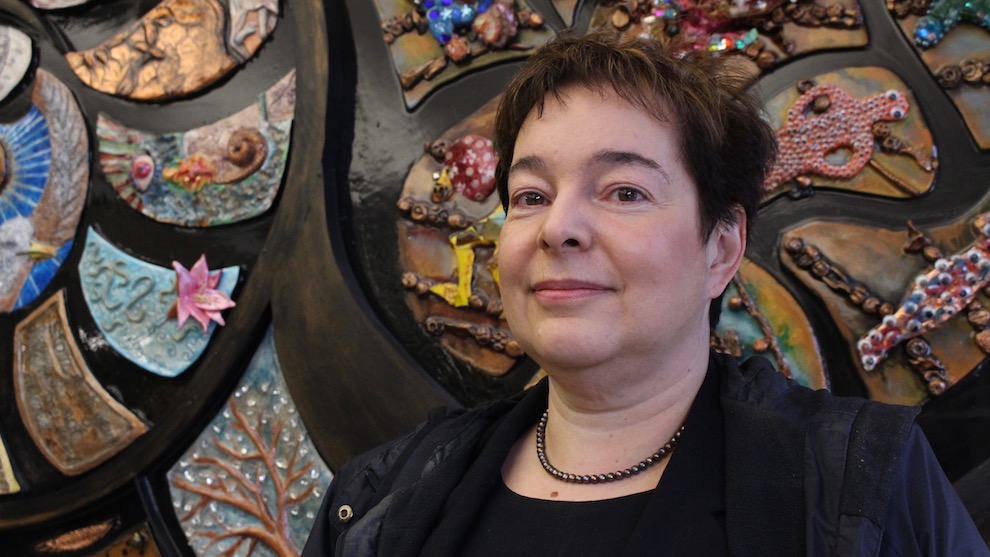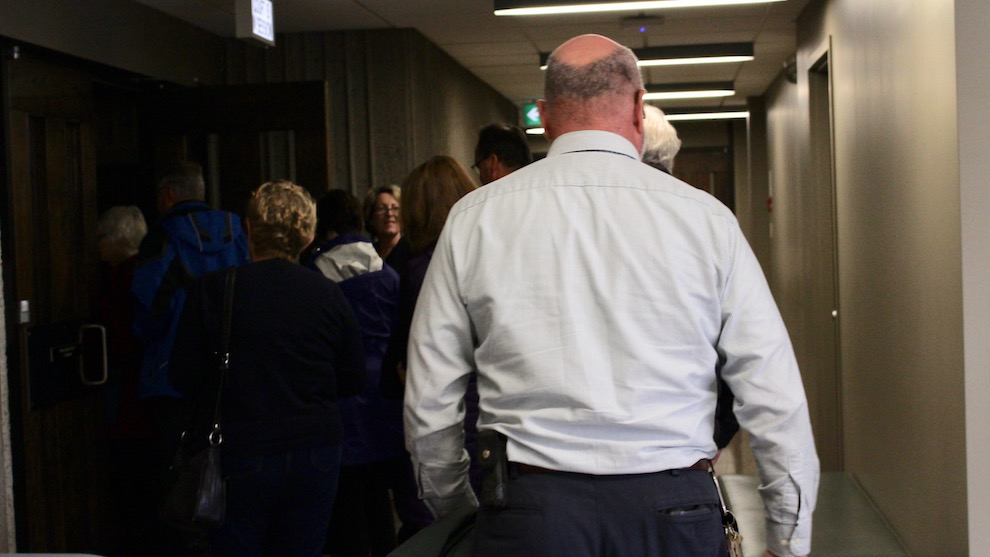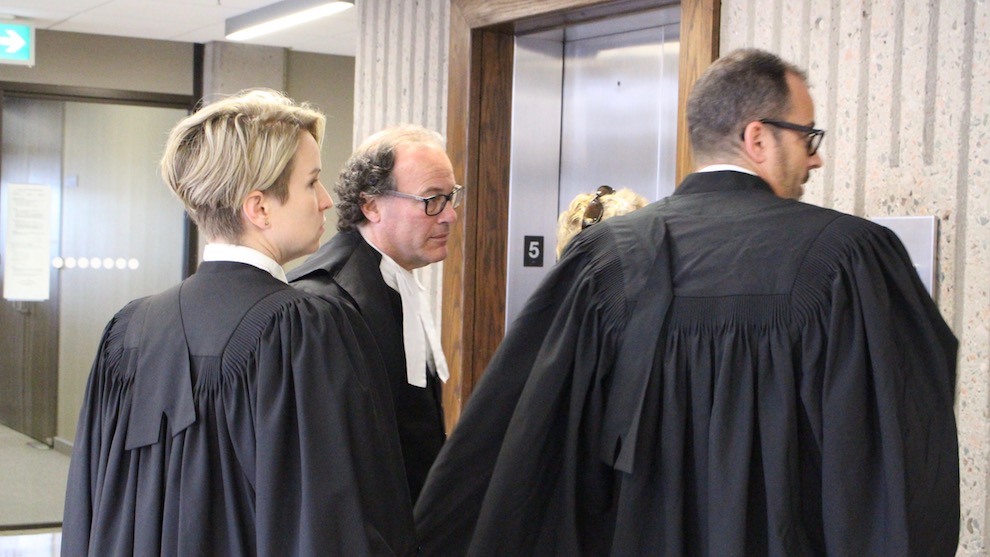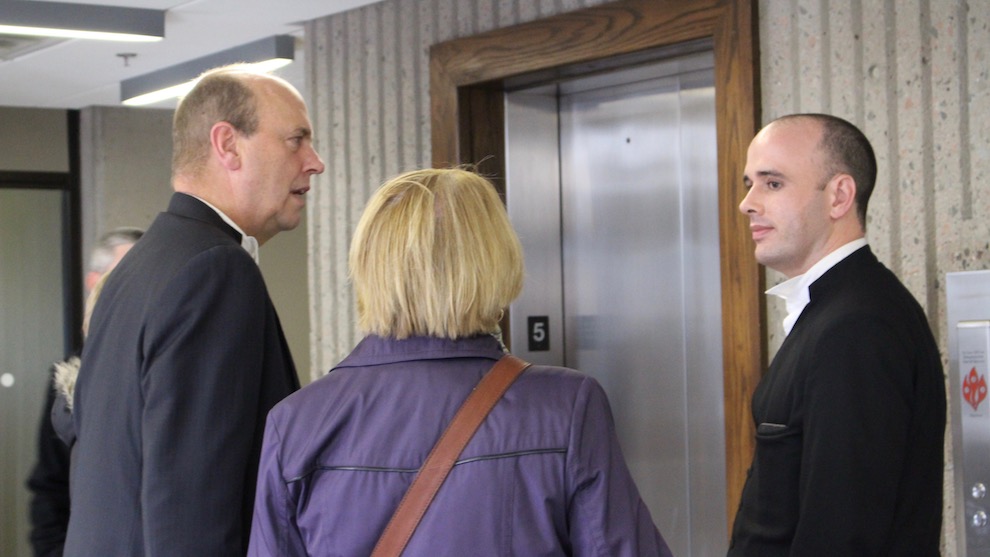Courts
Court of Appeal hears Dr. Gabrielle Horne case
Horne’s supporters gather at Halifax courthouse to hear arguments

caption
Dr. Gabrielle Horne hugged her supporters outside the courtroom on Tuesday.
caption
Dr. Gabrielle Horne outside the courtroom, waiting for the appeal to begin.Dr. Susan Gabrielle Horne was back in court this week, a year after she won a $1.4-million lawsuit against the QEII Health Sciences Centre and Nova Scotia Health Authority.
This time she’s fighting to keep the money that a jury awarded her, as the hospital and health authority ask the Court of Appeal to rescind her award and order a new trial in their cross-appeal.
Justice Joel E. Fichaud, Justice J. Michael MacDonald and Justice Cindy Bourgeois heard arguments at a two-day hearing Tuesday and Wednesday.
During both days Horne’s friends and colleagues sat with her in the courtroom, filling up both bench rows. These included Robin Whyte, Horne’s former colleague and a retired professor of pediatrics at Dalhousie University.
“She deserves full compensation for the loss of a scientific career and that’s what this is all about,” Whyte told The Signal outside the courtroom on Tuesday.
Now Horne has to wait even longer for the appeal court’s decision, which will be released at a later date.
“I just have to get through this waiting period to see what happens,” said Horne after court adjourned Wednesday. “I’m very worried about the day-to-day wait.”

caption
Horne’s supporters make their way to the courtroom after a break.From the beginning
In 2002 Horne was a cardiology researcher at the QEII Health Sciences Centre in Halifax, conducting research on heart failure. That’s when, she claims, her hospital colleague pressured her to give him credit on the research project she led.
Horne resisted.
She said, as a result, Elizabeth Ann Cowden, head of the Department of Medicine, dismissed her of hospital duties. This effectively stopped Horne’s research, which relied heavily on patient assessment. She also said hospital staff claimed her dismissal was due to their concern with her unfriendly behaviour.
Horne, the hospital and the health authority failed to reach an agreement after the dismissal.
As a result, Horne filed a “bad faith or malice” lawsuit against the hospital and the health authority. She was looking for damages for the loss of her reputation, loss of her career and the restoration of her career. Her lawyers asked for a $8.2-million settlement between the health authority, the hospital and other parties listed in the case.
In June 2016, a seven-member jury in the Supreme Court of Nova Scotia decided that the hospital and health authority acted in bad faith or malice when they dismissed Horne’s privileges.
Judge Allen P. Boudreau and the jury awarded Horne $1.4 million in damages for the loss reputation and her career, as well as $167,460.90 in legal fees.
Horne and her lawyers filed a notice of appeal in September 2016. In October 2016, a cross-appeal was filed by the hospital and the health authority.

caption
Horne’s lawyers Danielle Stampley, Craig Garson and Michael Wright speak with Horne during courtroom breaks on Tuesday.First day in court
Lawyers Michael D. Wright, Danielle Stampley and Craig Garson represented Horne in court on both Tuesday and Wednesday.
Wright began Tuesday’s hearing citing his reasons for the appeal.
First, he argued that Boudreau was wrong to dismiss Horne’s claim the hospital and the health authority breached their contract with her during her research. He said the question of the contract should have left to the jury to decide.
Wright argued the judge was wrong to combine Horne’s loss of reputation with the loss of her career in a single claim for damages. He said he believes these claims should have been assessed separately.
The third issue, Wright argued, is that the judge was wrong to find the damages for the restoration of Horne’s career as not foreseeable or reasonable. He said Boudreau was wrong to not mention the consequences that developed from the termination of Horne’s research to the jury. As a result of restrictions to her hospital privileges, Wright contends that Horne lost funding, staff and her lab.
Lawyers for the Nova Scotia Health Authority and the QEII Health Sciences Centre responded.
Peter Rogers, lawyer for the hospital and health authority, addressed the three justices on the panel. He asked for a new trial and the rescinding of Horne’s $1.4 million — if they find that the judge made an error in instructing the jury by using the wrong definition of “bad faith or malice.”
Rogers then argued Horne had no contract with the health authority and she was not an “actual employee” of the organization. He also argued her 1998 appointment letter from the hospital did not qualify as a contract, since any agreement between Horne, the hospital and the health authority expired after three years.
Rogers argued Boudreau “steered the jury in the wrong direction” with his definition of “bad faith or malice.” He also added that the judge’s focus on Dr. Blair O’Neill, head of the Cardiology Department, misled the jury to believe that O’Neill made the decisions to cut Horne of her privileges. Rogers claims O’Neill had only been an informant for Cowden during her assessment of Horne’s actions.
Marjorie Hickey, another lawyer for the health authority and hospital, argued there was some confusion as to what “loss of reputation,” “restoration of research career” and “loss of research career” mean, when the jury was given direction on how to decide the case.
Hickey argued the judge failed to explicitly advise the jury that claims for restoration of Horne’s career were not valid. The judge also failed, Hickey argued, to instruct the jury on the inadmissibility of Horne’s mental anguish, Horne’s initial claim to $8.2 million in damages and the claim of damages for the restoration of her career.

caption
Lawyers Peter Rogers, Marjorie Hickey and Ian Dunbar declined to comment during Wednesday’s lunch break.Second day in court
The second day of the hearing began with Roger’s response to issues raised by Justice MacDonald and Justice Fichaud.
Rogers urged the court to consider their claim that Boudreau was wrong to emphasize O’Neill’s participation in Cowden varying Horne’s hospital privileges.
Wright rebutted Rogers’ claim, stating that O’Neill was heavily involved as an influence on Cowden’s decision to bar Horne of her clinical privileges. Wright also argued against Rogers’ argument that the judge’s instruction created confusion among the jurors.
He said that Boudreau’s instruction was clear. And, Wright argued, there was no indication that the judge ordered the jury to assess possible damages as large as Horne’s initial settlement of $8.2 million. Later, Wright argued that the judge “must not trespass” on the jury’s judgment.
“Dr. Horne is content if the court simply reinforces what the jury decided is an appropriate amount,” Wright said in court. “If the court wishes to award a higher number she is not going to object.”
Craig Garson, another one of Horne’s lawyers, said the jury “made pretty clear decisions” in awarding her $1.4 million.
“This jury decided that this was probably the most successful professional reputation assassination in Canadian legal history, which is why they awarded what they awarded,” he told the court.
Hickey concluded Wednesday’s hearing by arguing that Craig’s arguments were “all speculation.”
Before the hearing adjourned, Justice MacDonald said that a decision will be made at a later date.
After Wednesday’s hearing Wendy Moscovitch, Horne’s neighbour, told The Signal that “justice will prevail.” Moscovitch said she suffered a heart attack and was excited about Horne’s heart failure research back in 2002.
“I feel really bad about how Dr. Horne was treated, but, I also feel really bad that her research will never come back,” Moscovitch said.

W
Wendy Moscovitch
L
Lauren Hazlewood